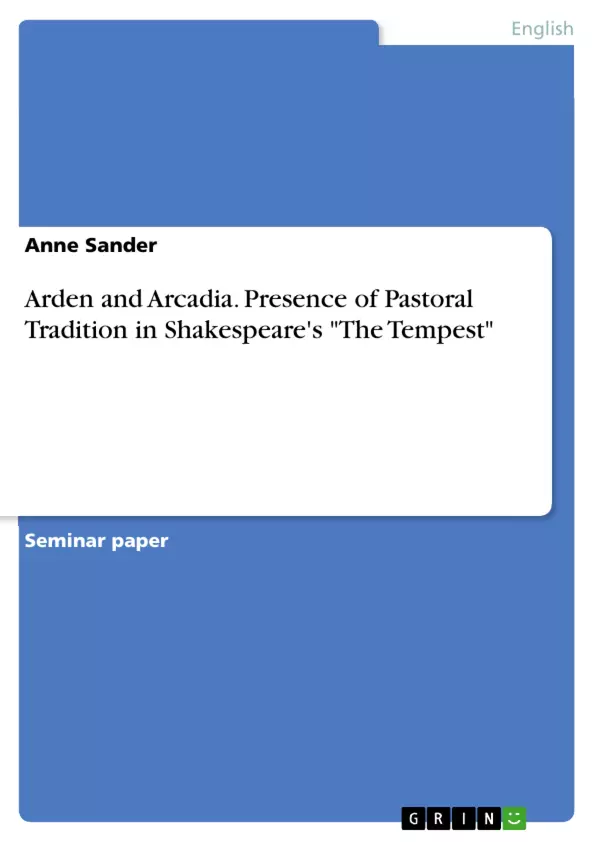Shepherds sitting in nature, singing and making music together and overall enjoying the Golden Age. Those are typical attributes for the pastoral genre. When thinking of Shakespeare's The Tempest (1611) a betrayed sorcerer or maybe the enslaved native Caliban comes to mind, not relaxed shepherds. However, it is a pastoral play which this term paper will prove.
Theocritus and Virgil are considered the founding fathers of this literary genre. Therefore, it is no surprise that The Tempest shows many similarities to the works of these poets. I will compare The Tempest with Theocritus' first and seventh Idyll and Virgil's first, ninth and fifth Eclogue; other pastoral poems of that period will not be discussed. This term paper will present those similarities between the poems and the play and show that Shakespeare's The Tempest was strongly influenced by the pastoral Eclogues and Idylls and is itself a pastoral play. To achieve this, I will closely look at some of the themes of The Tempest and show their relation to the pastoral genre.
The first time the play was performed was in 1611 (Vaughan 1). The date of publications of the Eclogues and the Idylls cannot be determined with certainty, however, Virgil lived between 70 BC (Ziolkowski 356) and 19 BC (Ziolkowski 1), while Theocritus lived around the 3rd century BC (Beloch 582), even though that is only an assumption. Therefore, the poems must have been written around the respective periods. Since there is a gap of over 1500 years between the first performance of The Tempest and the publication of the works of Virgil and Theocritus, it is astounding that there still are many connections between these works and that Shakespeare stayed true to the genre of pastoral.
Firstly, I will closely look at the first and seventh Idyll of Theocritus. There, I will discuss the pastoral items in the poems, like Daphnis, his death and the gifts the shepherds give each other. Second, I will do the same with Virgil's Eclogues. Lastly, I will focus on the play’s themes. The Tempest is filled with pastoral themes
Inhaltsverzeichnis (Table of Contents)
- Introduction
- Classic Pastoral
- Theocritus' Idylls
- Virgil's Eclogues
- The Tempest and the Pastoral
- The Question of Genre
- The Genre of Pastoral
- Tragicomedy
- Pastoral Themes
- The Tempest in a Classical Context
- The Question of Genre
- Conclusion
- Works Cited
Zielsetzung und Themenschwerpunkte (Objectives and Key Themes)
This term paper aims to demonstrate that Shakespeare's The Tempest is a pastoral play. It compares the play with selected works of Theocritus and Virgil, highlighting the similarities in themes and structure. The paper explores the question of genre in The Tempest, examining elements of pastoral, comedy, and tragedy.
- The influence of classic pastoral on Shakespeare's The Tempest
- The interplay of genre in The Tempest, particularly pastoral, comedy, and tragedy
- Pastoral themes present in The Tempest, including nature, retreat, and return, country and the city, politics, magic, masque, and music.
- The specific themes of eviction and death as shared elements between The Tempest and the works of Theocritus and Virgil
- The portrayal of Arcadia and the Golden Age in both The Tempest and the works of Theocritus and Virgil.
Zusammenfassung der Kapitel (Chapter Summaries)
The introduction sets the stage by establishing The Tempest as a pastoral play and outlining the paper's objectives. It introduces Theocritus and Virgil as the foundational figures of the pastoral genre and briefly discusses their works, outlining the specific poems to be analyzed.
Chapter 2 delves into the classical pastoral tradition, focusing on the contributions of Theocritus and Virgil. It examines the origins of both authors and their contrasting perspectives on rural life. Theocritus' Idylls, particularly the first and seventh, are explored. The first Idyll is analyzed for its pastoral elements, including the characters, their actions, and the theme of Daphnis' death. The seventh Idyll focuses on the journey to a harvest festival and the encounter with Lycidas, highlighting the connection to the first Idyll through the presence of Daphnis and Tityrus.
Chapter 3 delves into the genre of The Tempest. It explores the question of whether the play can be classified as purely pastoral and analyzes the presence of comedic and tragic elements. Edwin Greenlaw's seven pastoral plot points are applied to define The Tempest as a pastoral play. The chapter also explores the criteria of comedy and tragedy, referencing David Hirst's description of tragicomedy.
Schlüsselwörter (Keywords)
The main keywords and focus topics of the paper include the pastoral genre, Shakespeare's The Tempest, Theocritus' Idylls, Virgil's Eclogues, pastoral themes, Arcadia, Golden Age, eviction, death, comedy, tragedy, and tragicomedy.
- Arbeit zitieren
- Anne Sander (Autor:in), 2016, Arden and Arcadia. Presence of Pastoral Tradition in Shakespeare's "The Tempest", München, GRIN Verlag, https://www.grin.com/document/416283



